-
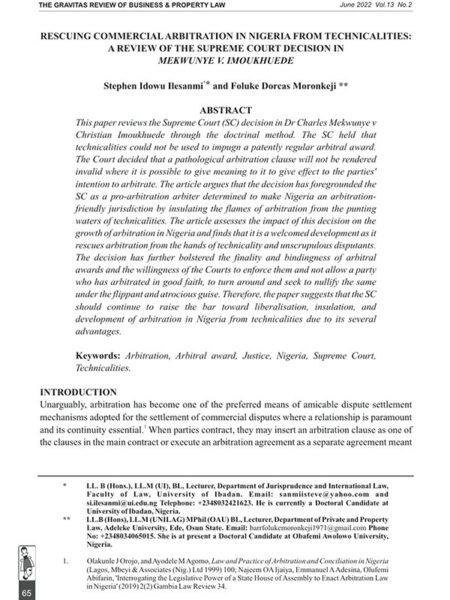
Rescuing Commercial Arbitration in Nigeria from Technicalities: A Review of the Supreme Court Decision in Mekwunye v Imoukhuede
0₦2,500.00Stephen Ilesanmi, Lecturer, University of Ibadan Nigeria and Foluke Moronkeji, Lecturer, Adeleke University Ede Nigeria, in their article, Rescuing Commercial Arbitration in Nigeria from Technicalities: A Review of the Supreme Court Decision in Mekwunye v Imoukhuede, review the Supreme Court’s (SC) decision in Mekwunye v Imoukhuede where the SC held that technicalities could not be used to impugn a patently regular arbitral award. The Court held that an arbitration clause would not be rendered invalid where it is possible to give meaning to it to give effect to the parties’ intention to arbitrate. Ilesanmi and Moronkeji argue that the SC decision has rescued arbitration from technicalities. They note that the decision has further bolstered the finality and bindingness of arbitral awards and the willingness of the Courts to enforce them and not allow a party who has arbitrated in good faith, to turn around and seek to nullify the same under flippant and atrocious guises.
-
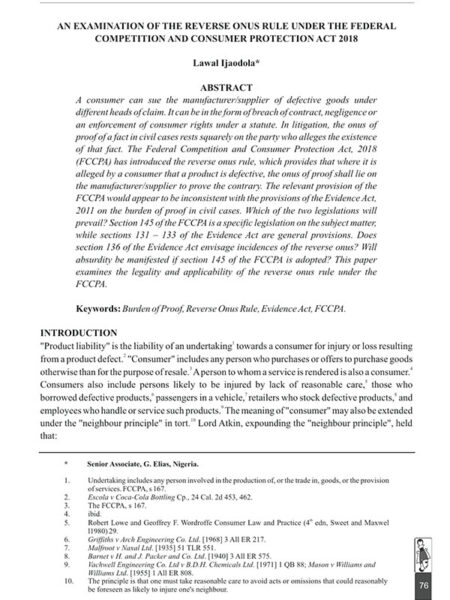
An Examination of The Reverse Onus Rule Under the Federal Competition and Consumer Protection Act 2018
0₦2,500.00Lawal Ijaodola, Senior Associate, G. Elias, in his article, An Examination of The Reverse Onus Rule Under the Federal Competition and Consumer Protection Act 2018, notes that a consumer can sue the manufacturer/supplier of defective goods under different causes of action. It can be in breach of contract, negligence, or an enforcement of consumer rights under a statute. In litigation, the onus of proof of a fact in civil cases rests squarely on the party who alleges the existence of that fact. The Federal Competition and Consumer Protection Act 2018 (FCCPA) has introduced the reverse onus rule, which provides that where it is alleged by a consumer that a product is defective, the onus of proof shall lie on the manufacturer/supplier to prove that the product is not defective. The relevant provision of the FCCPA would appear to be inconsistent with the provisions of the Evidence Act 2011 on the burden of proof in civil cases. Which of the two laws will prevail? Section 145 of the FCCPA is a specific legislation on the subject matter, while sections 131 – 133 of the Evidence Act are general provisions. Does section 136 of the Evidence Act envisage incidences of the reverse onus? Will absurdity be manifested if section 145 of the FCCPA is adopted? Lawal examines the contending issues and the legality and applicability of the reverse onus rule under the FCCPA.
-
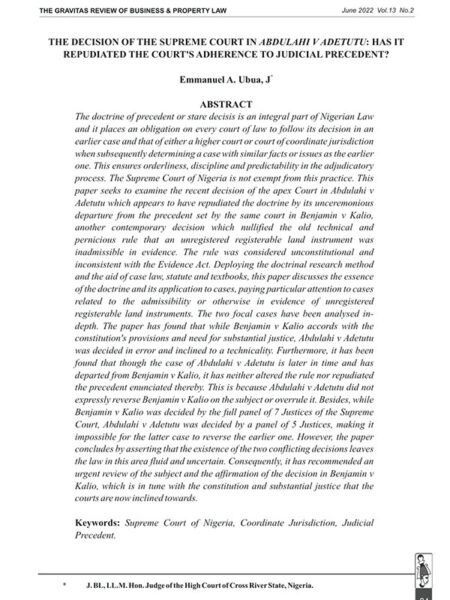
The Decision of The Supreme Court in Abdulahi v Adetutu: Has it Repudiated the Court’s Adherence to Judicial Precedent?
0₦2,500.00Honourable Justice Emmanuel Ubua of the High Court of Cross River State, in his article, The Decision of The Supreme Court in Abdulahi v Adetutu: Has it Repudiated the Court’s Adherence to Judicial Precedent? examines the decision of the Supreme Court in Abdulahi v Adetutu which appears to have repudiated the doctrine of stare decisis by its unceremonious departure from the precedent set by the same court in Benjamin v Kalio. The Supreme Court in Kalio nullified the old technical and pernicious rule that an unregistered registerable land instrument was inadmissible in evidence. The rule was considered unconstitutional and inconsistent with the Evidence Act. However, in the case of Abdulahi v Adetutu which was decided later, the Supreme Court seems to have somersaulted when it held that an unregistered instrument was inadmissible in evidence for breaching provisions of the Land Instruments Registration Law. Hon Justice Ubua comprehensively reviews the cases of Kalio and Adetutu and posits that while Kalio accords with constitutional provisions and the need for substantial justice, Adetutu was decided in error and inclined to technicality. Hon Justice Ubua recommends an urgent affirmation of the decision in Kalio, which is in tune with the constitution and substantial justice.
-
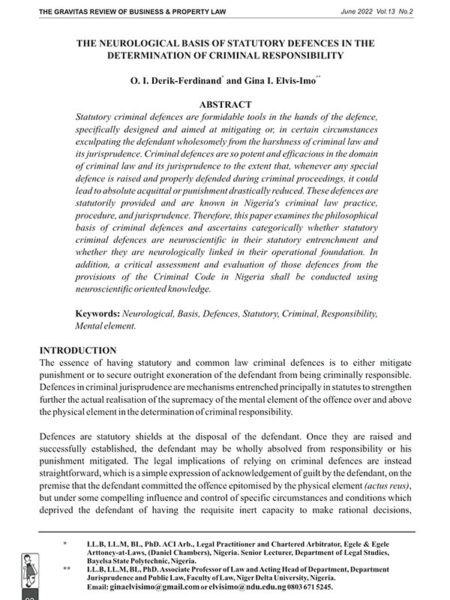
The Neurological Basis of Statutory Defences in the Determination of Criminal Responsibility
0₦2,500.00Dr O. I. Derik-Ferdinand, Senior Lecturer, Department of Legal Studies, Bayelsa State Polytechnic and Dr Gina Elvis-Imo, Acting Head of Department, Department of Jurisprudence and Public Law Niger Delta University, in their paper, The Neurological Basis of Statutory Defences in the Determination of Criminal Responsibility, explain that statutory criminal defences are formidable tools in the hands of the defence, specifically designed and aimed at mitigating or, in certain circumstances exculpating the defendant wholesomely from the harshness of criminal law. Derik-Ferdinand and Elvis-Imo examine the philosophical basis of criminal defences and ascertain whether statutory criminal defences are neuroscientific in their statutory entrenchment and whether they are neurologically linked in their operational foundation. In addition, they assess and evaluate the criminal defences from the provisions of the Criminal Code in Nigeria.
-
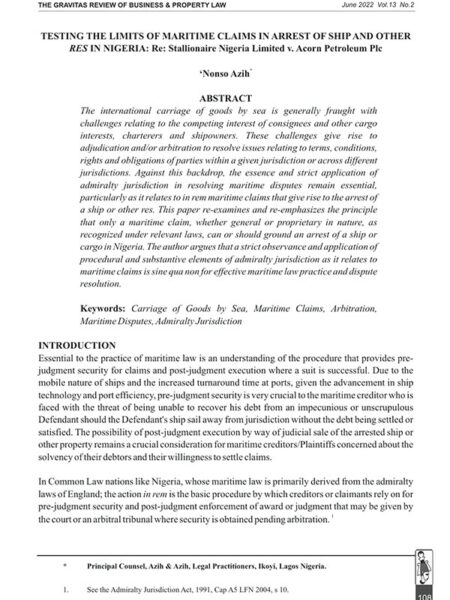
Testing the Limits of Maritime Claims in Arrest of Ship and Other Res in Nigeria: Re: Stallionaire Nigeria Limited v Acorn Petroleum Plc
0₦2,500.00Nonso Azih, Principal Counsel Azih & Azih, in his article, Testing the Limits of Maritime Claims in Arrest of Ship and Other Res in Nigeria: Re: Stallionaire Nigeria Limited v Acorn Petroleum Plc, notes that international carriage of goods by sea is generally fraught with challenges relating to the competing interest of consignees and other cargo interests, charterers and shipowners. These challenges give rise to adjudication or arbitration to resolve issues relating to parties’ terms, conditions, rights, and obligations. The essence and strict application of admiralty jurisdiction in resolving maritime disputes remain essential, particularly as it relates to in rem maritime claims that give rise to the arrest of a ship or other res. Nonso re-examines and re-emphasises the principle that only a maritime claim, whether general or proprietary in nature, as recognised under relevant laws, can or should ground an arrest of a ship or cargo in Nigeria. He argues that a strict observance and application of procedural and substantive elements of admiralty jurisdiction as it relates to maritime claims is sine qua non for effective maritime law practice and dispute resolution.
-
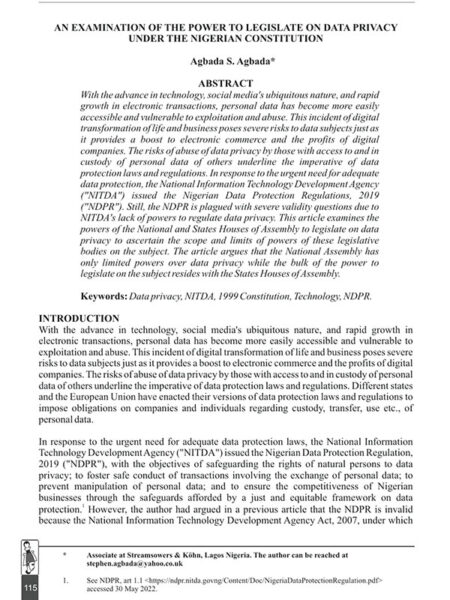
An Examination of the Power to Legislate on Data Privacy under the Nigerian Constitution
0₦2,500.00Stephen Agbada, Associate at Streamsowers & Köhn, in his article, An Examination of the Power to Legislate on Data Privacy under the Nigerian Constitution, notes that in response to the urgent need for adequate data protection, the National Information Technology Development Agency (NITDA) issued the Nigerian Data Protection Regulations, 2019 (NDPR). Does NITDA have the power to regulate data privacy? What is the difference between Data Privacy and Data Protection? Is Data Protection an Exclusive, Concurrent or Residual List item under the Nigeria Constitution? Agbada proffers his views on these pertinent questions in his examination of the powers of the National and States Houses of Assembly to legislate on data privacy.
-
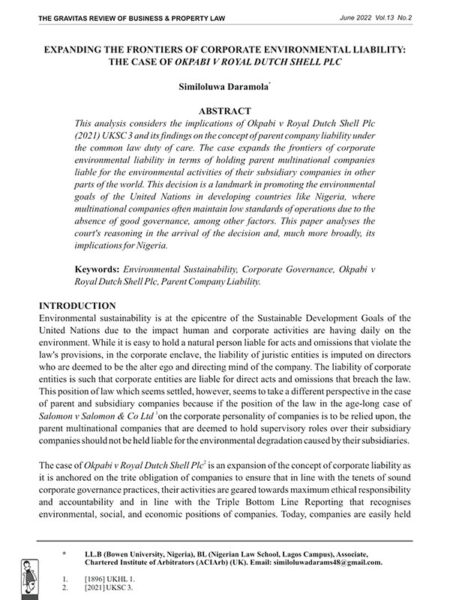
Expanding the Frontiers of Corporate Environmental Liability: The Case of Okpabi v Royal Dutch Shell Plc
0₦2,500.00Similoluwa Daramola, in her paper, Expanding the Frontiers of Corporate Environmental Liability: The Case of Okpabi v Royal Dutch Shell Plc, which reviews the English case, considers the implications of the case and the court’s decision on the concept of the parent company liability under the common law duty of care. The case expands the frontiers of corporate environmental liability in terms of holding parent multinational companies liable for the environmental activities of their subsidiary companies in other parts of the world. Similoluwa argues that the decision is vital in promoting the environmental goals of the United Nations in developing countries like Nigeria, where multinational companies often maintain lower standards of operations.
-

Risks in Financing Renewable Energy Projects in Emerging Markets: A Nigerian Case Study
0₦2,500.00Oluwafunmilayo Olofinlade of the University of East London UK, in her paper, Risks in Financing Renewable Energy Projects in Emerging Markets: A Nigerian Case Study, notes that the world is inching away from the use of energy sources that deplete the ozone layer and towards the adoption of a net-zero path in resolving the ever-worsening issue of climate change. Alternative energy sources whose utility does not deplete the ozone layer have been identified as germane to reducing greenhouse gas emissions. This has seen remarkable investments in renewable energy globally. Oluwafunmilayo examines renewable energy financing in Nigeria. She considers the main risks involved in renewable energy project agreements as they affect emerging economies like Nigeria and proffers ways to mitigate them.
-
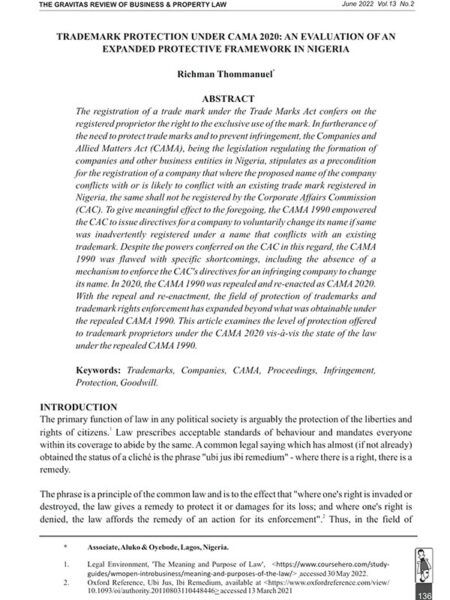
Trademark Protection Under the Companies and Allied Matters Act 2020: An Evaluation of an Expanded Protective Framework in Nigeria
0₦2,500.00Richman Thommanuel, Associate, Aluko & Oyebode, in his article, Trademark Protection Under the Companies and Allied Matters Act 20202: An Evaluation of an Expanded Protective Framework in Nigeria, explains that in furtherance of the need to protect trademarks and prevent infringement, the Companies and Allied Matters Act (CAMA) stipulates as a precondition for the registration of a company, that where the proposed name of the company conflicts with or is likely to conflict with an existing trade mark registered in Nigeria, the name shall not be registered by the Corporate Affairs Commission (CAC). To give meaning to the provision, the CAMA 1990 empowered the CAC to issue directives for a company to voluntarily change its name if the same was inadvertently registered under a name that conflicts with an existing trademark. Despite the powers conferred on the CAC in this regard, the CAMA 1990 was flawed with shortcomings, including the absence of a mechanism to enforce the CAC’s directives for an infringing company to change its name. This lacuna has been addressed by CAMA 2020. Richman examines the expanded protective framework under the re-enacted CAMA.
-
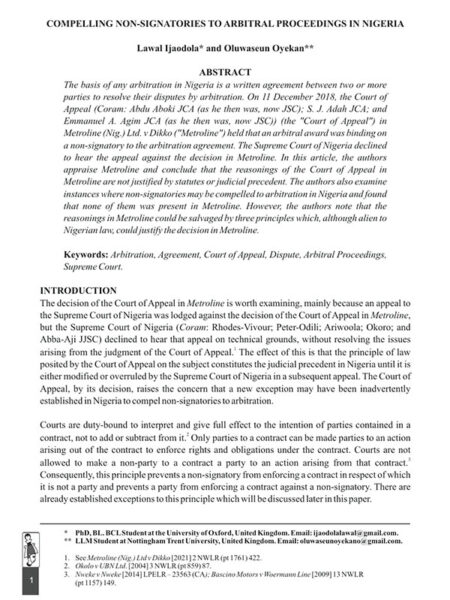
Compelling Non-Signatories to Arbitral Proceedings in Nigeria
0₦2,500.00Dr Lawal Ijaodola and Oluwaseun Oyekan, both formerly of G. Elias and now at the University of Oxford and Nottingham Trent University, United Kingdom, respectively, in their article, Compelling Non-Signatories to Arbitral Proceedings in Nigeria, note that the basis of any arbitration in Nigeria is a written agreement between two or more parties to resolve their disputes by arbitration. However, in the case of Metroline (Nig.) Ltd. v Dikko (Metroline), the Court of Appeal held that an arbitral award was binding on a non-signatory to the arbitration agreement. Dr Ijaodola and Oyekan appraise Metroline and conclude that the reasonings of the Court of Appeal are not justified by statutes or judicial precedent. They also examine instances where non-signatories may be compelled to arbitration in Nigeria and found none of them was present in Metroline. However, the authors note that the reasonings in Metroline could be salvaged by three principles which, although alien to Nigerian law, could justify the decision.
-
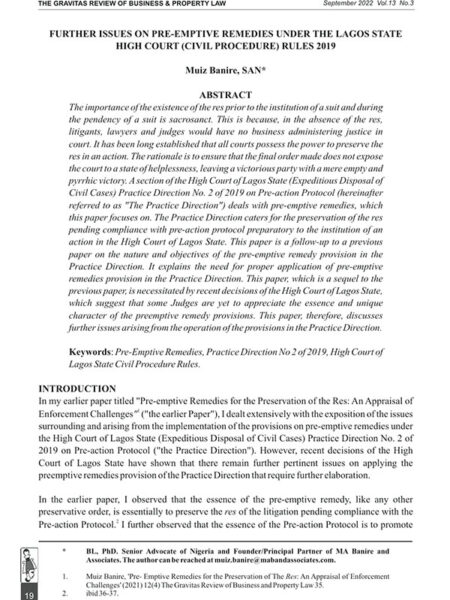
Further Issues on Pre-Emptive Remedies Under the Lagos State High Court (Civil Procedure) Rules 2019
0₦2,500.00Dr Muiz Banire SAN, Principal Partner of MA Banire and Associates, in his article, Further Issues on Pre-Emptive Remedies Under the Lagos State High Court (Civil Procedure) Rules 2019, notes the importance of the existence of the res prior to the institution of a suit and during its pendency. He explains that all courts possess the power to preserve the res in an action. The rationale is to ensure that the final order does not expose the court to a state of helplessness, leaving a victorious party with a mere empty and pyrrhic victory. A section of the High Court of Lagos State (Expeditious Disposal of Civil Cases) Practice Direction No. 2 of 2019 on Pre-action Protocol deals with pre-emptive remedies. Dr Banire, in the article, which is a sequel to the one published by The Gravitas Review in December 2021, explains the need for a proper application of preemptive remedies provision in the Practice Direction. He examines recent decisions of the High Court of Lagos State, which suggest that some Judges are yet to appreciate the essence and unique character of the preemptive remedy provisions.
-
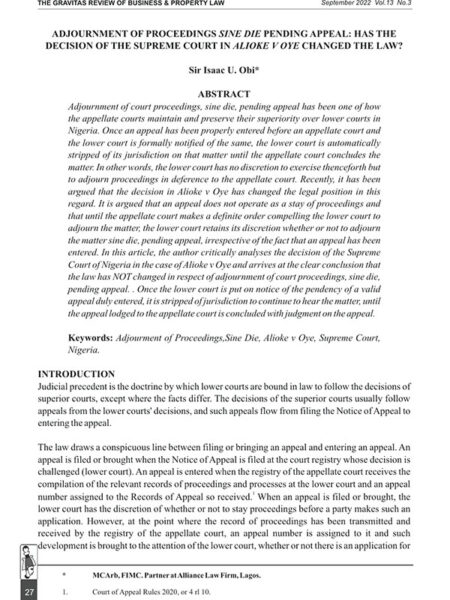
Adjournment of Proceedings Sine Die Pending Appeal: Has the Decision of the Supreme Court in Alioke V Oye Changed the Law?
0₦2,500.00Sir Isaac Obi, Partner at Alliance Law Firm, in his article, Adjournment of Proceedings Sine Die Pending Appeal: Has the Decision of the Supreme Court in Alioke V Oye Changed the Law? explains that adjournment of court proceedings, sine die, pending appeal has been one of the ways the appellate courts maintain and preserve their superiority over lower courts in Nigeria. Once an appeal has been properly entered before an appellate court and the lower court is formally notified, it is automatically stripped of its jurisdiction on that matter until the appellate court concludes the matter. Recently, it has been argued that the decision of the Supreme Court in Alioke v Oye has changed the law. It is argued that an appeal does not operate as a stay of proceedings and that until the appellate court makes a definite order compelling the lower court to adjourn the matter, the lower court retains its discretion whether or not to adjourn the matter sine die, pending appeal, irrespective of the fact that an appeal has been entered. Sir Obi critically analyses the decision in Alioke v Oye to see whether the law has really changed.
The Gravitas Review of Business & Property Law



